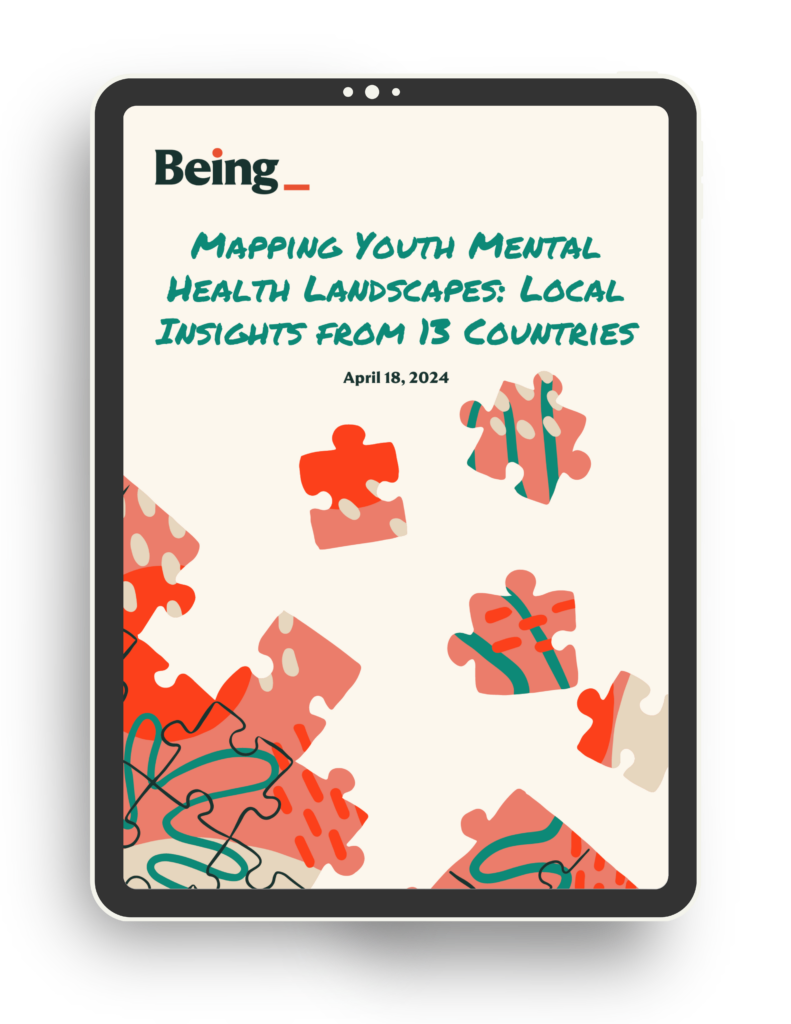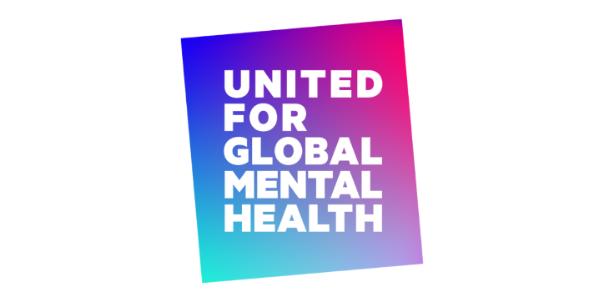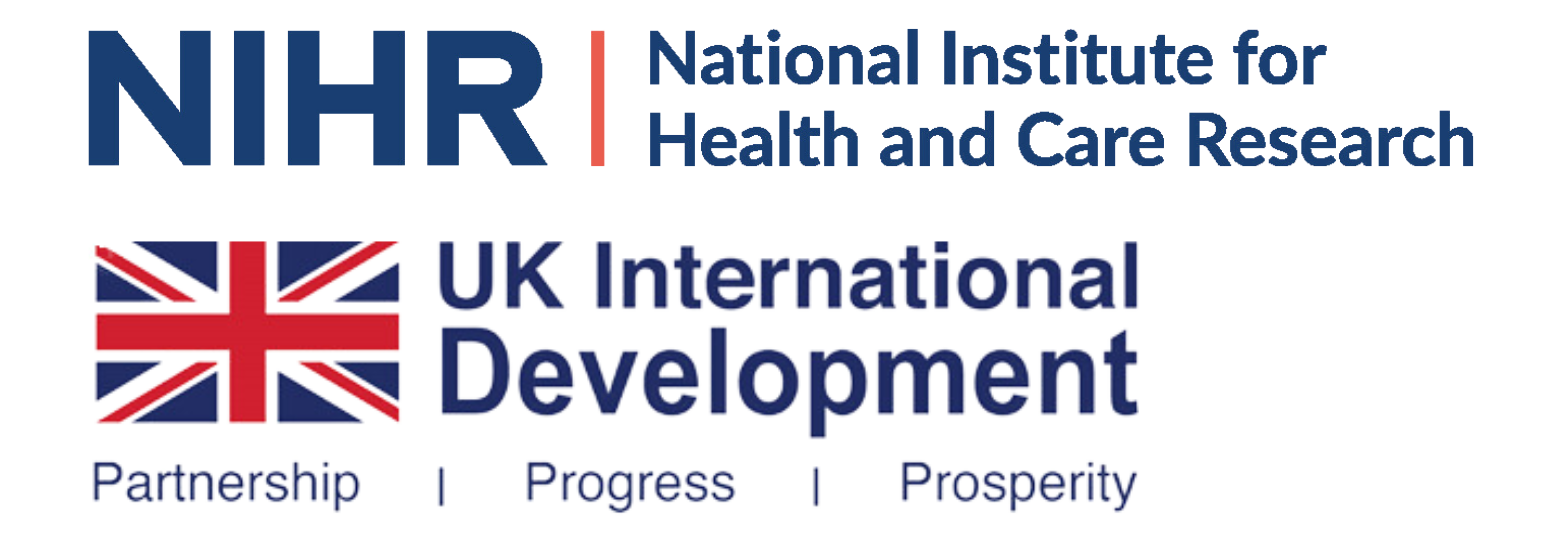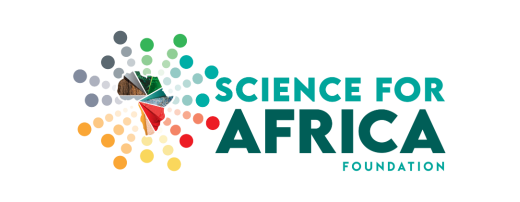— Young people and mental health experts in 13 countries share what’s driving youth mental health challenges in comprehensive new report —

Thursday, April 18, 2024 (Toronto, Canada) — Amid growing global concerns about youth mental health, Being’s new report, Mapping Youth Mental Health Landscapes: Local Insights from 13 Countries, provides a comprehensive landscape analysis of youth mental health around the globe, revealing key challenges and opportunities from consultations with young people and mental health experts. From Colombia to Vietnam, the report dives into some of the country’s most pressing mental health issues, drivers, and strategies for collaboration and action. These lessons have already informed Being’s funding priorities, which will allocate over $48 million CAD for innovation and ecosystem support across its 12 priority countries.
The Being report identified nine major factors shaping youth mental health in 13 countries, including:
- Family functioning (prioritized in Colombia, Egypt, Ghana, India, Indonesia, Morocco, Pakistan, and Vietnam)
- Mental health literacy and stigma (prioritized in Ghana, India, Indonesia, Romania, Senegal and Tanzania)
- Bullying (Egypt, Ghana, Romania, Indonesia, and Vietnam)
- Youth exposure to violence (prioritized in Colombia, Ecuador, Senegal, and Indonesia)
- Academic pressure (prioritized in Egypt, India, Pakistan, and Vietnam)
- Self-esteem (Colombia, Ecuador, and Morocco)
- Cyberbullying and excessive social media use (Morocco, Pakistan, and Romania)
- Substance abuse (Sierra Leone and Tanzania)
- Poverty and unemployment (Senegal and Sierra Leone)
“Being’s landscape analysis is based on the understanding that those closest to youth mental health challenges are best placed to identify the key needs and barriers.,” said Melani O’Leary, Associate Director, Global Health Innovation at Grand Challenges Canada. “We drew on the expertise of local organizations and institutions to convene conversations around youth mental health and prioritize the key issues at the root of mental health challenges among youth in each country. Importantly, young people and people with lived experience of mental health challenges were at the heart of the process – they served as advisors, facilitators, stakeholders in consultations and validators of the findings.”
The collaborative research documented in the report was led by institutions and organizations with established networks in the priority countries. Through stakeholder consultations, desk research, mobilization, and consensus-building, Being’s landscape analysis country partners focused on identifying the main factors impacting youth mental health to establish the initiative’s priority areas for investment in each country.
“Living as young people, mental health is an issue that is close to our hearts, and we can relate to our landscape analysis findings.” – Said Wilsen Widal Kho, Research Assistant at the Center for Reproductive Health, Universitas Gadjah Mada, Indonesia.
The report also offers recommendations for national and global mental health organizations, funders, policymakers, and those wielding resources to tackle barriers related to the uptake, scale, and sustainability of solutions to youth mental health challenges across the 13 countries. Above all, the report highlighted the need for increased investment in young people’s mental health and meaningful youth engagement in decision-making processes and program development.
“Around 10% of the world’s children and adolescents experience mental health challenges – for reasons such as detrimental family dynamics, bullying or lack of self-esteem.,” said Alex Schulze, interim CEO of Fondation Botnar. “Whilst such drivers of mental health differ by context, we hope that mental health funders, researchers, practitioners and local decision-makers leverage Being’s latest report insights to work with young people to create more favourable conditions for their mental health.”
From Learning to Action – Over $48 Million CAD allocated through the Being Initiative for youth mental health innovations
Funding from $200,000 up to $1,500,000 CAD is available for innovation and ecosystem development projects in Colombia, Ecuador, Ghana, India, Indonesia, Morocco, Pakistan, Romania, Senegal, Sierra Leone, Tanzania, and Vietnam to support innovations that address the key mental health drivers in each priority country. Being is funding prevention and promotion ideas targeting underserved youth aged 10-24 and projects tackling systemic barriers to sustainable mental health initiatives.
Organizations with innovative ideas to address youth mental health challenges in the 12 priority countries can apply for Being’s Proof-of-Concept, Transition-to-Scale, and Ecosystem Catalyst funding on Being’s website. Priority will be given to youth-led organizations.
— 30 —
About Being
Being is an international mental health initiative working toward a world where young people feel well and thrive. We’re working together with young people to improve their mental wellbeing through research and innovation. By focusing on mental health prevention and promotion, Being aims to create positive, lasting change in local communities and beyond. We’re hosted by Grand Challenges Canada (funded in part by the Government of Canada) in partnership with Fondation Botnar, The United Kingdom’s Department of Health and Social Care, using UK aid through the National Institute for Health and Care Research (NIHR), the Science for Africa Foundation, and United for Global Mental Health. Additionally, Orygen serves as Being’s learning and support provider, offering technical support to funded projects. www.being-initiative.org
Lead country partners for this report:
Being’s landscape analysis was led by local academic, public health, and research institutions and organizations in each priority country, including:
- Pontificia Universidad Javeriana in Colombia,
- Junta de Beneficiencia de Guayaquil in Ecuador
- The General Secretariat of Mental Health and Addiction Treatment in Egypt;
- Africa Academy for Public Health in Ghana and Tanzania;
- Indian Law Society in India;
- Universitas Gadjah Mada in Indonesia;
- Fondation Mohammed VI of Sciences and Health and Mohammed VI University of Sciences and Health in Morocco;
- Global Institute of Human Development of Shifa Tameer-e-Millat University in Pakistan;
- Transylvania College Foundation in Romania;
- African Population and Health Research Center in Senegal and Sierra Leone; and
- The Institute of Sociology, Vietnam Academy of Social Sciences in Vietnam.






